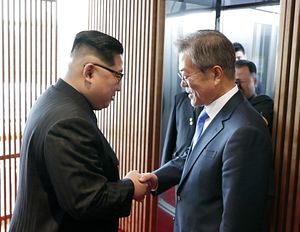In late August, United Nations Command denied permission for a South Korean train to cross the DMZ into North Korea. The train was carrying South Korean officials taking part in a joint survey of the conditions of North Korea’s rail line between the DMZ and Sinuiju on the Chinese border.
Reconnecting and repairing North Korea’s rail lines is one of the initial programs the South Korean government hopes to use to engage North Korea, along with the reconnection of roads and the opening of a liaison office in Kaesong. South Korean President Moon Jae-in had hoped to reconnect the North and South’s roads and rail, as well as open the liaison office by the end of this year. While it is unclear why the train was denied permission to cross the DMZ, it raises questions about how quickly inter-Korean economic engagement will be able to move forward and the constraints it will face.
Ever since the Panmunjom Summit, there have been growing expectations that economic engagement with North Korea would resume in the near future. Beyond rail, road, and the liaison office, South Korea is working with North Korea on reforestation, and there have been suggestions about reopening tourism at Mount Kumgang and normalizing operations at the Kaesong Industrial Complex, which was closed by the Park Geun-hye administration over concerns that the complex was helping to finance North Korea’s nuclear weapons and missile programs.
Banks and asset managers, in addition to creating task forces to support inter-Korean economic cooperation, have begun creating new unification funds that have attracted tens of millions of dollars to invest in companies that stand to benefit from inter-Korean cooperation. KB Kookmin is developing a fund to allow South Koreans to leave their money as inheritance for their North Korean relatives, while Nonghyup is considering reopening its branch in the Mount Kumgang tourism facilities.
Hyundai Asan, which developed the Mount Kumgang tourist site and the Kaesong Industrial Complex, along with other South Korean businesses, has begun developing investment plans as well, while state run research institutes such as the Korea Development Institute have been studying how to engage North Korea economically. While these efforts are prudent should circumstances change, to date a lack of progress on denuclearization and sanctions have constrained South Korean efforts to pursue economic engagement with the North.
While UN and U.S. sanctions on North Korea have become fairly comprehensive, financial sanctions, prohibitions on investment and joint ventures, bans on North Korean exports, and limits on exports of fuel to North Korea constrain South Korean efforts to engage the North. For example, efforts to reopen Kaesong or Mount Kumgang would run afoul of UN prohibitions on the transfer of bulk cash, while insurance and financial incentives used to help run both projects would violate other UN sanctions. The liaison office itself has run into concerns about the provision of fuel to North Korea.
U.S. sanctions matter as well. Banks, such as KB Kookmin or Nonghyup could find themselves in violation of U.S. financial sanctions, which enable “[the Department of the] Treasury to target anyone conducting significant trade in goods, services, or technology with North Korea, and to ban them from interacting with the U.S. financial system.”
It is these constraints that led South Korean officials to look to rail and road initiatives as a means to engage North Korea. There may be more flexibility for public infrastructure under UN sanctions, which provide possible exceptions for “joint ventures or cooperative entities, in particular those that are non-commercial, public utility infrastructure projects not generating profit.” With inter-Korean rail cooperation still confined to the joint rail survey, South Korea has reaffirmed that the survey does not fall under sanctions and will resume shortly.
However, to move forward on most inter-Korean economic cooperation, South Korea will need exemptions from UN and U.S. sanctions. While South Korea obtained an exemption from sanctions for the Winter Olympics in PyeongChang, the United States blocked a request after the Games by the International Olympics Committee to provide athletic equipment to the North to allow athletes to prepare for future Olympic Games. As South Korea continues to pursue sports diplomacy with the North, it has looked for creative ways to stay within the sanctions.
Other exemptions by the UN have been given for the recent family reunions, the Singapore Summit between U.S. President Donald Trump and Kim Jong Un, as well as the resumption of the inter-Korean military hotline. The UN has also created an exemption process for humanitarian assistance, but has yet to grant a waiver for a significant economic venture with North Korea.
Without progress on denuclearization, there is unlikely to be much flexibility from the United States, whose support will be needed for exemptions from UN and U.S. sanctions. After South Korean National Security Advisor Chung Eui-young’s most recent visit to North Korea, a State Department official said, “As President Moon has stated, ‘The improvement of relations between North and South Korea cannot advance separately from resolving North Korea’s nuclear program’ … We reaffirmed the Panmunjom Declaration during the Singapore Summit and we did so because progress on inter-Korean relations must happen in lockstep with progress on denuclearization.”
To ease the constraints on economic engagement, South Korea will need U.S. support for exemptions from certain U.S. and UN sanctions. While the United States and the UN have shown a willingness to ease sanctions to help facilitate dialogue, to gain support to ease sanctions for economic engagement there will need to be progress on denuclearization.

































